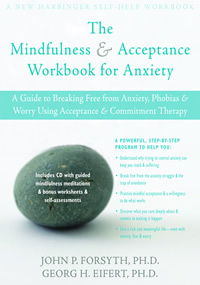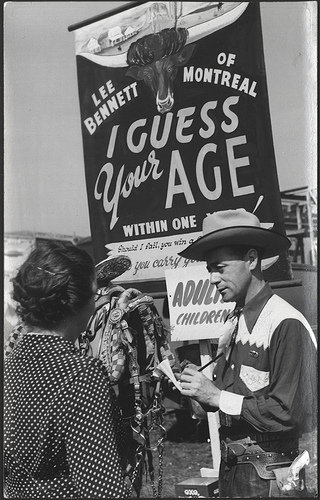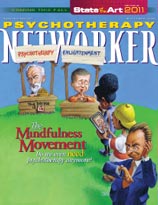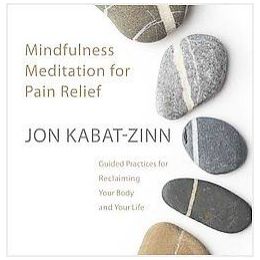The Importance of Mind-Wandering
 A collection of boredom studies from Wired:
A collection of boredom studies from Wired:
The secret isn’t boredom per se: It’s how boredom makes us think. When people are immersed in monotony, they automatically lapse into a very special form of brain activity: mind-wandering. In a culture obsessed with efficiency, mind-wandering is often derided as a lazy habit, the kind of thinking we rely on when we don’t really want to think. (Freud regarded mind-wandering as an example of “infantile” thinking.) It’s a sign of procrastination, not productivity.
In recent years, however, neuroscience has dramatically revised our views…
ACT Anxiety and Depression Workbooks
 From the Recommended Reading page, a couple of titles worth highlighting: The Mindfulness and Acceptance Workbook for Anxiety and The Mindfulness and Acceptance Workbook for Depression, a matching pair of Acceptance and Commitment Therapy (ACT) workbooks.
From the Recommended Reading page, a couple of titles worth highlighting: The Mindfulness and Acceptance Workbook for Anxiety and The Mindfulness and Acceptance Workbook for Depression, a matching pair of Acceptance and Commitment Therapy (ACT) workbooks.
Instead of trying to take on and eliminate difficult thoughts and feelings, ACT encourages accepting them and getting on with what’s most important to you. Identifying what’s most important to you is a big component of the approach.
For a reading-free sample of Acceptance and Commitment Therapy, try one of the audio exercises linked here. A whole sidebar full of free ACT audio and worksheets awaits at Live Mindfully.
Mid-Life Crisis
 A history, from Scientific American:
A history, from Scientific American:
[Season’s of a Man’s Life author] Levinson felt that midlife crises were actually more common than not and appeared like clockwork between the ages of 40 to 45. For Levinson, such crises were characterized primarily by a stark, painful “de-illusionment” process stemming from the individual’s unavoidable comparison between his youthful dreams and his sobering present reality. For most men, life moves so swiftly that, by the time you look back at what’s happened, you realize you’ve already suffered an irreparable loss of chance and opportunity. This life review causes depression, anxiety, and “manic flight,” a sort of desperate, now-or-never fumbling to experience the pleasures one has long denied oneself and an escape from stagnation.
(via MindHacks)
West Meets East
 Ronald Siegel wrote this long article about mindfulness and psychotherapy for the clinician-readers of Psychotherapy Networker. Doesn’t mean you can’t give it a look. A sample:
Ronald Siegel wrote this long article about mindfulness and psychotherapy for the clinician-readers of Psychotherapy Networker. Doesn’t mean you can’t give it a look. A sample:
[M]indfulness is the opposite of experiential avoidance…It allows us to feel the urge to have an alcohol drink arise and pass rather than heading to the bottle, to get on the airplane and feel the fear rather than stay grounded, to be with the tight muscles and violent imagery of anger rather than shut down in depression, and to feel hurt rather than escape into delusion…[M]indfulness practices can help us loosen our preoccupation with ourselves.
Guided Meditations
 Another source of free guided mindfulness meditations emerges: Spotify. Here are a few collections that showed up in a search there. Plenty more where these came from. Enjoy.
Another source of free guided mindfulness meditations emerges: Spotify. Here are a few collections that showed up in a search there. Plenty more where these came from. Enjoy.
Judith Day – Introduction To Mindfulness Meditation
Jon Kabat-Zinn – Mindfulness Meditation For Pain Relief
Elisha Goldstein Ph.D. – Mindful Solutions For Stress, Anxiety, And Depression
Jack Kornfield – Guided Meditations For Difficult Times
Decision Fatigue
The NYT Magazine asks, Do You Suffer From Decision Fatigue?
It’s different from ordinary physical fatigue — you’re not consciously aware of being tired — but you’re low on mental energy. The more choices you make throughout the day, the harder each one becomes for your brain, and eventually it looks for shortcuts…
Echoing this TED talk from Barry Schwartz:
Grounding the Helicopter
 Toward a less hovering approach to parenting: How to Land Your Kid in Therapy (The Atlantic).
Toward a less hovering approach to parenting: How to Land Your Kid in Therapy (The Atlantic).
[A]ll of this worry about creating low self-esteem might actually perpetuate it. No wonder my patient Lizzie told me she felt “less amazing” than her parents had always said she was. Given how “amazing” her parents made her out to be, how could she possibly live up to that? Instead of acknowledging their daughter’s flaws, her parents, hoping to make her feel secure, denied them. “I’m bad at math,” Lizzie said she once told them, when she noticed that the math homework was consistently more challenging for her than for many of her classmates. “You’re not bad at math,” her parents responded. “You just have a different learning style. We’ll get you a tutor to help translate the information into a format you naturally understand.”
Relationship Health
Extra motivation for figuring out how to get along better?: The way you relate to your partner can affect your long-term mental and physical health, study shows (Science Daily).
“We already know from prior research that people in stable, happy marriages experience better overall health than do those in more conflicted relationships,” said Professor Hicks. “We can now further conclude from our current research that individuals who are in insecure relationships are more vulnerable to longer-term health risks from conflict than are others.”
Better Sex Through Therapy?
Study Links Empathy, Self-Esteem, and Autonomy with Increased Sexual Enjoyment (jhsph.edu):
Sexual pleasure among young adults (ages 18-26) is linked to healthy psychological and social development, according to a new study by researchers at the Johns Hopkins Bloomberg School of Public Health.